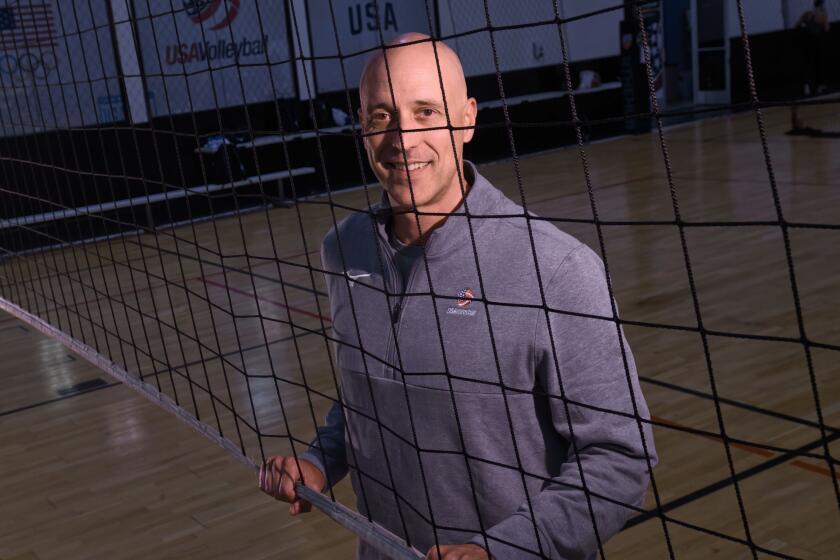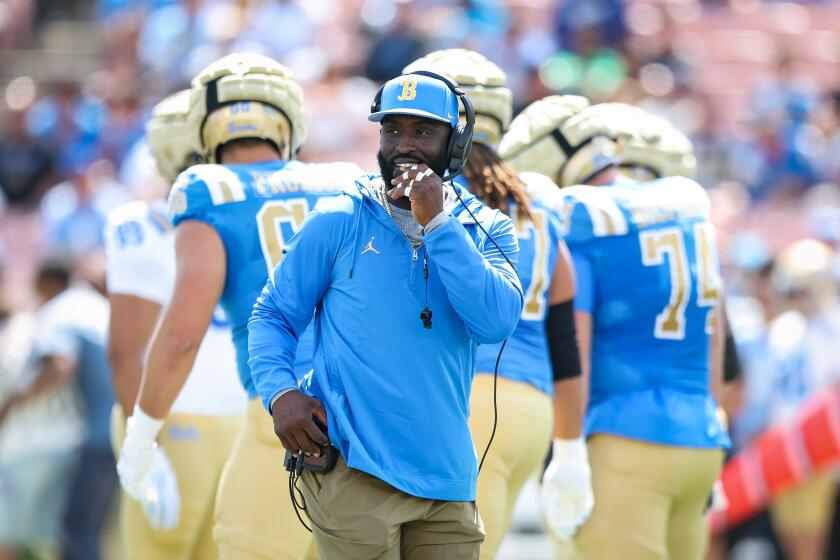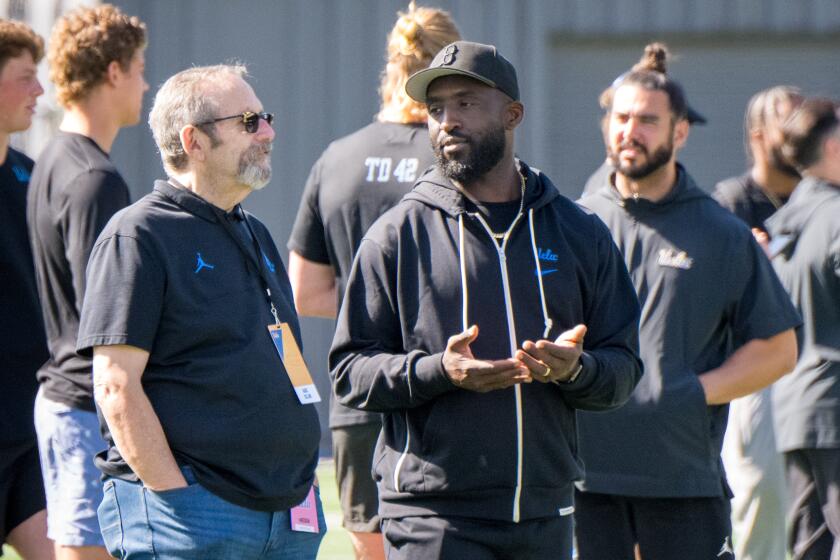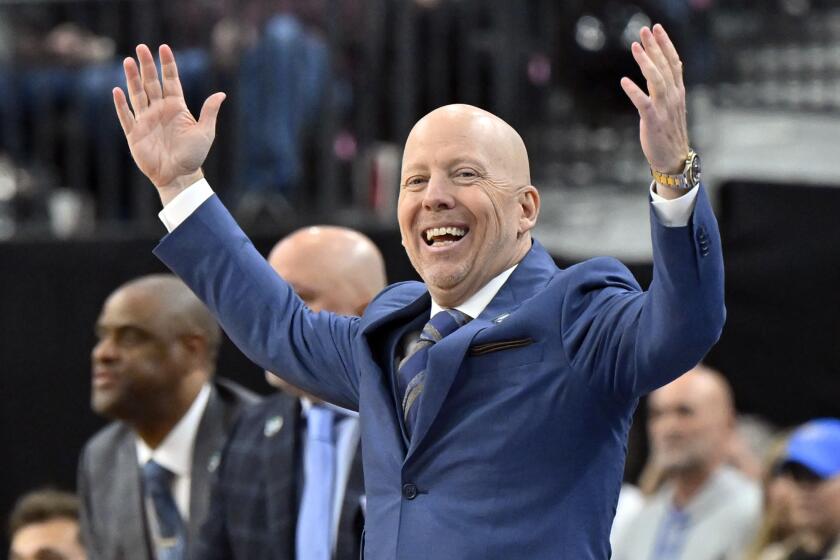Scandals in the Wind
They will remember Jim Harrick at the University of Georgia, just as surely as those at Rhode Island and UCLA will remember his basketball coaching tenures there.
Harrick won a lot -- and left investigations in his wake.
In announcing his resignation as Georgia’s coach Thursday, Harrick was unrepentant to the end, saying he expected to be exonerated when the school finishes investigating alleged improprieties in his program, and adding that if any rules violations occurred during his watch they were “nothing major.”
Aside from that mess, Harrick also faces scrutiny related to a sexual harassment case against Rhode Island, where he coached from 1997 to ’99. A lawsuit, filed by a former female assistant in the basketball office, named Harrick and included charges of rules violations in his program, from fixing grades to arranging cars for players.
Rhode Island settled the suit in February for $45,000 but is investigating the claims.
Harrick’s reputation has been tainted by a history of alleged misconduct that dates to his eight seasons as UCLA’s coach, from 1988-89 to 1995-96. His fall from grace began a year after he had ascended to his greatest heights in 1995, when he became the only UCLA basketball coach other than John Wooden to lead the Bruins to a national title.
Suspicions grew when a vehicle registered in his name was sold to the sister of recruit Baron Davis by the youngest of Harrick’s three sons, Glenn.
Harrick was cleared by the Pacific 10 Conference of violating NCAA rules in the sale of the car, but at the same time his career in Westwood was unraveling because of another scandal.
On Oct. 15, 1996, Harrick submitted an expense form for a $1,085 recruiting dinner four days earlier at a Westwood restaurant. That dinner violated the NCAA one-player-per-recruit rule because there were five UCLA players present and only three prospective recruits. Though the two extra players, Cameron Dollar and Charles O’Bannon, were at a different table, their dinners were included on the bill.
Harrick probably could have survived such a minor offense, but he repeatedly lied to school officials during their investigation of the dinner and he put Bruin assistant coach Michael Holton in a compromising position through his actions.
UCLA officials cited the possible NCAA violations and Harrick’s conduct afterward as reasons for his firing on Nov. 6, 1996.
Thrown out of his dream job, Harrick resurfaced when he was named coach at Rhode Island in 1997. But he wasn’t the same. Disillusioned and bitter, he never missed an opportunity to lash out at UCLA and former athletic director Peter Dalis for what he perceived as their shabby treatment of him.
“In the end,” Harrick said, “I felt like Hannibal Lechter.”
Others will argue that Harrick had only himself to blame. Lying about the expense report wasn’t the first time he had put himself in a compromising position at UCLA.
The NCAA put UCLA on three years’ probation in 1999 for rules violations that took place while Harrick was coach. They included excessive phone calls to recruits and providing Pat Barrett, a youth coach with ties to high-profile players, with an excessive number of tickets to Bruin games and a 1995 national championship ring.
Barrett said Harrick gave him the ring as a thank-you gift for helping to work with some of the Bruin players.
Harrick claimed he didn’t remember ordering or giving the ring to Barrett.
When asked about his relationship with Barrett in the summer of 1996, months before an investigation of the UCLA program, Harrick told The Times, “Pat Barrett is like my son.” He later clarified the statement, saying, “I was joking.”
The NCAA and Pac-10 also investigated UCLA’s 1988 recruitment of Don MacLean after allegations surfaced that Harrick had visited MacLean’s home and signed him to a letter of intent during the so-called “dead period,” when coaches are prohibited from contacting recruits.
The allegations were contained in an account written by Bob Hawking, MacLean’s coach at Simi Valley High. Hawking composed the notes after learning he would not be hired as a UCLA assistant coach, a job he said Harrick had promised him. UCLA nixed the arrangement because it was thought that Hawking’s hiring would give the impression of impropriety.
Instead, Hawking, who later became head coach at Cal State Fullerton, was hired as an assistant by Pepperdine Coach Tom Asbury, Harrick’s former assistant at the Malibu school.
The investigation was dropped in 1991, the last of three inquiries into the recruitment of MacLean, who became a four-year starter and UCLA’s all-time leading scorer.
After being forced from UCLA, Harrick sometimes acted like a man with a chip on his shoulder. He called Steve Lavin, his successor, a puppet for Dalis.
“In my experience, he’s an innocent victim,” Harrick said of Lavin in 1998. “They control everything he says, everything he does. He has to do what the boss tells him to do.”
At the time, Harrick’s Rhode Island team had just advanced to the Elite Eight of the NCAA tournament the same night UCLA had lost to Kentucky. But Harrick resisted the temptation to gloat.
“UCLA is a fine place,” he said. “There were just a couple of people there that didn’t want me around and got me out. Happens in companies every day. It’s not brain surgery.... The only thing I didn’t like was that they tried to take away my career.”
Harrick started his coaching career as an assistant at Inglewood Morningside High in 1964. Although he lived in Southern California for 37 years, he never lost the folksy drawl in his voice, a remnant of his West Virginia upbringing.
He became head coach at Morningside in 1969 but left on a sour note when Glendale Hoover stunned his unbeaten and heavily favored team in the second round of the Southern Section playoffs in 1973. After that season, he took his first college job, as an assistant to Dutch Belnap at Utah State.
Belnap, now a color analyst for Weber State basketball radio broadcasts, views Harrick’s checkered past with thinly veiled contempt.
“I’m disappointed that it all happened,” Belnap recently told the Salt Lake Tribune. “I’m disappointed, but I’m not really shocked. He was very enthusiastic.”
Belnap hired Harrick because of his energy and recruiting connections to Southern California that helped the Aggies sign two Morningside standouts, Michael Santos and Oscar Williams.
Santos led Utah State in scoring for two seasons. Williams became the program’s all-time leader in assists, but was later convicted of murdering his wife when they lived in Las Vegas.
Harrick left Utah State in 1977 to become an assistant at UCLA. He got his first college head coaching job at Pepperdine in 1979 and guided the Waves to five West Coast Conference titles, four NCAA tournament appearances and a 167-97 record in nine seasons.
His time in Malibu was relatively trouble-free -- no investigations by either the NCAA or WCC. “Everything is fine at the ‘Dine,” Harrick liked to say.
While at Pepperdine he befriended Barrett, whose connection to blue-chip players was seen as a jackpot for Harrick. One of Barrett’s proteges, Tom Lewis, transferred to Pepperdine in 1986 after playing for USC as a freshman and became the Waves’ leading scorer.
Later, when Harrick coached at UCLA, a steady stream of top-flight recruits flowed from Barrett’s youth programs to Westwood. They included Charles and Ed O’Bannon, Jelani McCoy, Trevor Wilson, Mac-Lean, Darrick Martin and Davis.
A car purchased by Barrett was signed over to Olujimi Mann two months before the highly regarded point guard from Santa Ana Valley High gave an oral commitment to UCLA in 1995. Academic problems prevented him from playing for the Bruins.
Harrick says he plans to return to Los Angeles in retirement to be closer to his family. But it will take a while before all of the controversy following him is put to rest.
*
(BEGIN TEXT OF INFOBOX)
PEPPERDINE
1979-1988
* RECORD: 167-97 (.633)
Made NCAA tournament four times in nine seasons
RHODE ISLAND
1997-1999
* RECORD: 45-22 (.672)
Made NCAA tournament in both seasons; round of eight in 1998
UCLA
1988-1996
* RECORD: 192-62 (.756)
Made NCAA tournament in all eight seasons; national champion, 1995
GEORGIA
1999-2003
* RECORD: 67-53 (.558)
Made NCAA tournament twice in four seasons
Go beyond the scoreboard
Get the latest on L.A.'s teams in the daily Sports Report newsletter.
You may occasionally receive promotional content from the Los Angeles Times.



